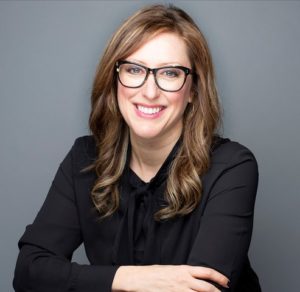 By nature, Jennifer Marchand is a perfectionist. All through high school she strove to have the highest marks in the class, be the best at sports, but beyond working extra hard to achieve these things, she had no idea what she wanted to be or do with her life.
By nature, Jennifer Marchand is a perfectionist. All through high school she strove to have the highest marks in the class, be the best at sports, but beyond working extra hard to achieve these things, she had no idea what she wanted to be or do with her life.
That uncertainty obviously didn’t stick with her, as she has achieved success and fulfillment in her career that has brought her to her current role as Assistant Vice-President and Government Relations Leader with Cargill.
Marchand recently hosted MWAF’s AgChat, where she shared some of the lessons she has learned throughout her 25-year career journey about what it means to be a successful leader and grow within the agricultural industry.
After graduating from the University of Saskatchewan with a biology degree in 1998, Marchand landed a job as a lab technician with Cargill that she was neither qualified for or particularly interested in. At the time, canola was a fledgling industry in Canada and through that work she began to grow with the industry. Over the next 11 years she assumed a number of roles, each with more responsibility, eventually becoming an expert and leader in food safety, quality and regulatory affairs for Cargill. Even so, Marchand was still ‘staying in her lane’. “I took opportunities that I knew I could be successful at,” she said. “I only did what I knew.”
Shifting to a service leadership mindset.
That changed when she was thrust into a leadership position that forced her to focus not on herself and her own role, but on growing and developing the abilities and skills of others on her team. And she found she loved it.
“I shifted to a service leadership mindset and developed a passion for leadership,” she said. Marchand had finally found what she wanted to do! It wasn’t easy, though. AT first, she had little guidance or leadership, she still lacked confidence, and admits to having a few pity parties along the way. Her perfectionist nature meant she was making unnecessary work and putting extra stress on herself, while at the same time she avoided challenges because she was still afraid to stretch herself.
Feedback is a gift.
The pivotal point for Marchand came when Cargill assigned her a new leader, Jen Henderson. Henderson provided valuable feedback and taught Marchand one essential lesson that changed her life: that she didn’t need to know everything.
“I learned that feedback is a gift, and the mark of a true leader is being able to share that feedback from a place of caring. I began to stretch because I realized I didn’t need to know all the answers. I could use the skills I had to lead the team, and I learned to leverage the strength of others. I could move forward and make decisions and be comfortable with the knowledge that it might not work out. My mindset evolved to ‘sure, why not?’
Marchand’s key lessons about leadership.
- Do the hard things.
Even if you aren’t sure how you will achieve them. - If it scares you, good!
That means you are moving in the right direction. - If you aren’t risking failing, you aren’t growing.
You need to challenge yourself. - No one in the room is smarter than you are.
Each and every person has their own unique talents, so speak up.
Marchand admits that one of the hardest things she has done is to join external agricultural boards and committees, where she was often the only woman around the table, but that’s also where the things she has learned about leadership come into their own.
“When I started with those boards, I was very different than who had sat on those boards in the past,” she said. “I looked different, my experience was different, my communication was different, and it was very intimidating because again I thought, look at all these people who are experts in the canola industry in Canada. I tended to be quiet, thinking I must not be as smart as they are. After a while I realized, not only am I as smart, but there are things that I know that these people have not had experience in, and that’s why I am here, that’s the strength that I can bring. It’s a real power to learn that you don’t need to know everything.” - Find your allies.
There are many people who will fill in the gaps where you don’t have the knowledge to support you.Feedback is a gift.
Share and help others grow.
“Women in the agricultural space don’t often have a lot of people there to mentor and help us and provide honest feedback, so it’s our obligation to share with each other and provide that feedback in the name of growth,” Marchand said.
- Do not let emotion overtake you and assume good intentions.
“It’s very easy to tackle a situation, or a new role or a challenge with emotion and make assumptions about what the intentions of the other people involved in that are,” Marchand said. “Sometimes people don’t have good intentions, and sometimes people are not coming at a situation with an unbiased perspective, but you have to be mindful of stepping back when emotion is the immediate reaction. If you step back and think about someone else’s perspective on a situation, and why they are approaching it that way, it gives you pause and time to think so you can react in a way that is constructive as opposed to something that may make a challenge or opportunity to not move forward.”
- Start operating letting possibility drive your actions and not fear.
“Go to ‘why not?’ instead of ‘what if?’ It’s amazing what can happen when you switch that mindset,” Marchand said.
- Be yourself.
Marchand credits this as the best advice she has ever received. “When I took this role, because I am public facing with multiple stakeholders outside of the business, I was nervous that I had to change who I was,” she said. “I had a leader say to me ‘all you need to be is yourself’. I remind myself of that all the time because if you are genuine, and you genuinely care, people can tell and they will support you and help you grow.” - Honesty and integrity are always the best policy.
“If you start with a foundation of being genuine and honest and operating with integrity, you are going to have success,” Marchand says. “And you are going to attract the people in the industry that want to help you grow and that will fill in the gaps in your knowledge and help you navigate the landscape in agriculture.” - It’s hard.
“It’s not easy; it’s not about time management, it’s not magically going to happen for you if you just get a day planner and plan it out,” Marchand said. “Navigating a career in agriculture is hard work, and if you do the hard work and take those chances to fail you will succeed.” - Be a leader.
“Be the person who pushes someone and challenges them and provides feedback as a gift and has the growth of your team, your peers at heart,” Marchand said. “Be the leader who changes someone’s life, and find the leader that will change yours. Within your organization there may not be that leader who you can reach to, but there are a lot of people out there that are willing to help you grow outside of that space. Find them because I don’t think anyone can do it alone.”
If you missed this incredible AgChat with Jennifer Marchand, make sure you visit MWAF’s events page to find out about upcoming AgChats, subscribe to MWAF’s e-newsletter and consider joining MWAF for special discounts and invites to MWAF events and programs.




